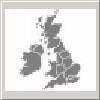Please note that the NBN Gateway map service has been terminated as of 1 April 2017.
As soon as a replacement map service is available, distribution maps will hopefully appear here again.
In the meantime, you can get some idea of distribution from the NBN Atlas website.
35.093 BF792
Mirificarma mulinella
(Zeller, 1839)
Wingspan 11-15 mm.
This moth may frequently be identified by a pair of dark stripes running longitudinally down each forewing. However in some individuals these stripes may merge. In others, they may be absent altogether making identification difficult.
The larvae feed on gorse (Ulex) and broom (Cytisus), feeding on the flowers before pupating amongst the leaves on the ground.
The adult moth flies from July to September and is common on heathland and wasteland throughout Britain
- Larva: (description Ian F. Smith):
Foodplant: Ulex europaeus (gorse) and Cytisus scoparius (broom) inside unopened flower bud. Also reported on Lupinus arboreus, (tree lupin) on leaflet sown into pod. April to May or June.
Intermediate instar larva
Length: 7 mm, April.
Head: Pitchy black.
Prothoracic shield: Shiny black, divided by yellowish medial line.
Thoracic legs: Translucent greyish brown with black markings.
Body: Yellow.
Spiracles: Brownish black.
Pinacula: Small, prominent, shiny brown-black. Large grey prespiracular pinaculum and subventral pinaculum on prothorax (T1).
Setae: Transparent colourless.
Anal plate: Shiny light brown.
Prolegs: Coloured as abdomen with brown crochets.
Late instar larva
Length: 8mm, April.
Head: Pitchy black.
Prothoracic shield: Shiny black, divided by whitish medial line.
Thoracic legs: Translucent greyish brown with black markings.
Body: Yellowish white with pale pinkish trapezium on dorsum of each segment. (MBGBI 4(2) states body is dull green, but in three rearings for this description, green was not observed.)
Spiracles: Brownish black.
Pinacula: Small, prominent, shiny brown-black. Large grey prespiracular pinaculum and subventral pinaculum on prothorax (T1);
Setae: Transparent colourless.
Anal plate: Shiny light brown.
Prolegs: Coloured as abdomen with brown crochets.

 UKMoths
UKMoths 



